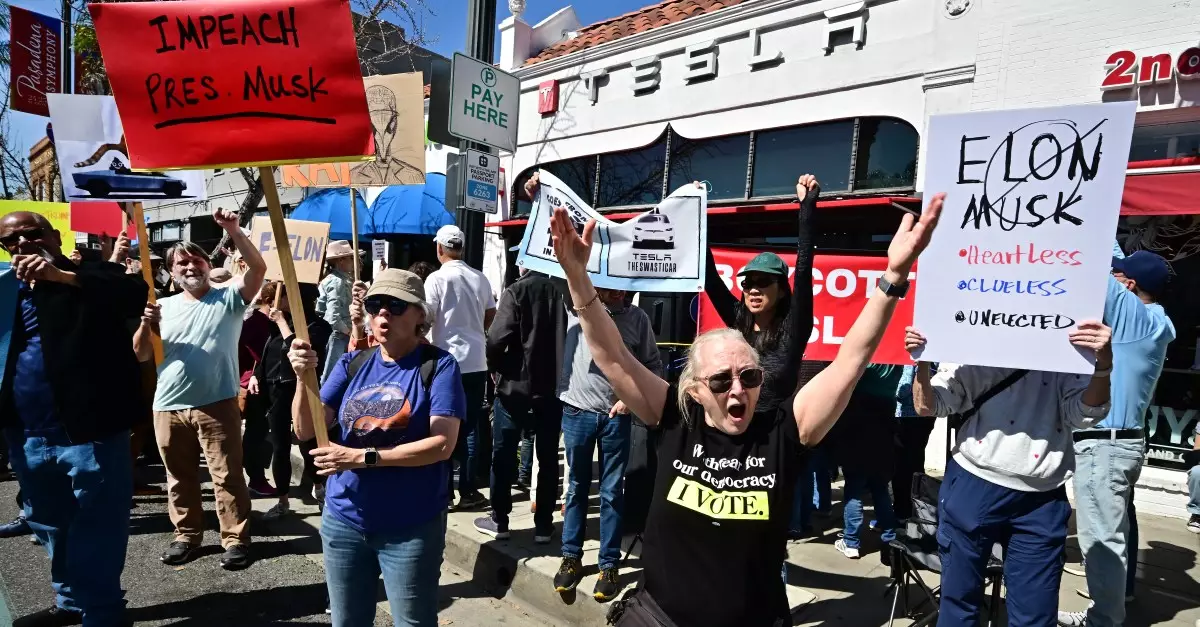In a remarkable escalation of grassroots activism, organizers are gearing up for a widespread demonstration on March 29th, hoping to rally protestors at all 277 Tesla showrooms alongside numerous Supercharger stations around the globe. This event is being dubbed the “biggest day of action” thus far, emblematic of a growing frustration among citizens regarding the actions of Elon Musk, now head of the newly established Department of Government Efficiency (DOGE). The protests, which initially started at only a few locations in early February, have surprisingly gained momentum, prompting individuals from various sectors—actors, academics, journalists, and politicians—to unite in their disapproval of Musk’s drastic measures against federal programs and staff.
This collective dissent is not merely about the actions of a single CEO; it reflects a wider anxiety about corporate influence over democratic processes. The protestors, known as the Tesla Takedown protesters, have united under the banner of defending essential government support systems that serve vulnerable communities. While the protests have sparked discussions about freedom of expression, they have also ignited swift reactions from the government, with President Trump and Musk labeling the demonstrations as “domestic terrorism.”
The Need for Strategic Dissent
The rhetoric coming from many participants in these protests underscores a critical viewpoint: they do not believe they are merely fighting against Musk or Tesla’s fluctuating stock prices; they see this as a broader struggle for the soul of democracy in the face of ascendant corporate imperialism. Alice Hu, the executive director of Planet Over Profit, has emphasized the importance of demonstrating against not just Tesla’s practices but the larger narrative of unchecked corporate power. As tensions rise, she urges fellow protestors to liberate their voices against a backdrop of intimidation and fear tactics that threaten to undermine free speech.
Political representatives like Rep. Jasmine Crockett (D-Texas) are echoing this sentiment, reinforcing the notion that the protestors are champions of liberty rather than aggressors. Yet, the legal landscape is increasingly fraught with challenges. The Attorney General has threatened severe repercussions for anyone found responsible for violence, complicating the dialogue around the right to protest. The cautious emphasis on non-violence comes from a place of necessity, highlighting the difference between peaceful demonstration and overcrowded rhetoric that could easily spiral out of control.
The Economic Stakes Involved
Central to the protests is Tesla’s plummeting stock price, which has nosedived nearly 40% this year amidst waning consumer enthusiasm and intensifying competition within the electric vehicle market. This decline represents more than just a financial crisis; it embodies a potential threat to Musk’s empire, which has largely been built on the faith of investors who once celebrated Tesla as a beacon of the future. The voices calling for deliberate economic action—such as the sentiment shared by investigative journalist Micah Lee—argue that if the protests can sufficiently cripple Tesla’s financial standing, the repercussions could reach far and wide, potentially destabilizing Musk’s financial clout.
In this digital age, the beating heart of activism often manifests through online movements fueled by social media dynamics, memetic culture, and public engagement. Joan Donovan’s observations reveal Musk’s increasing estrangement from everyday realities, compounded by his bravado online. Even as protestors leverage digital platforms, breaking apart the glossy corporate image Musk has created, the stakes involve a broader battle between everyday people and the tycoons of Silicon Valley.
The Dichotomy of Power in the Modern Age
Moreover, the events tied to Tesla’s protests shine a spotlight on the vast power dynamics that exist within the intersection of technology and governance. Musk’s interactions with Trump and other political figures have led to worries about conflicts of interest and the erosion of democratic checks and balances. As Tesla’s board is comprised of close friends and family of Musk, there are burgeoning concerns regarding the company’s independence from its leader’s whims and the influences of partisan politics.
Despite the potential risks involved, many activists remain undeterred, expressing that the protests represent a moral imperative to stand firm against authoritarianism in all its forms. Their fight symbolizes more than just opposition to one individual; it is a struggle to reclaim the agency of citizens overshadowed by the ambitions of a few. Nonetheless, as the day of action approaches, the reality remains that the interplay between corporate domination and grassroots resistance will be continually contested, challenging the very foundation upon which democratic engagement stands.


Leave a Reply